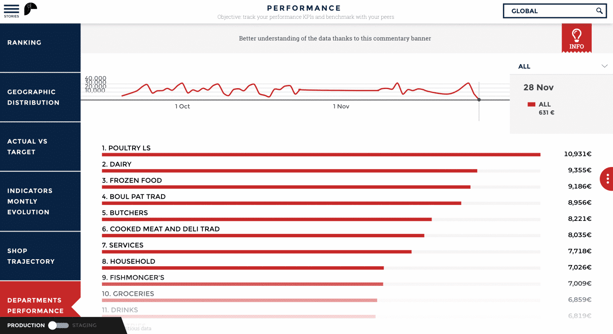How adaptive KPIs could have saved Tesco’s loyalty program

Clement
Publié le 30.05.19
Mis à jour le 13.01.26
4 min
Résumer cet article avec :
Why adaptive KPIs ? Data Science has had a great impact on the retail industry. A great example is Tesco and its loyalty program that has been proven to be a great asset for over 20 years. Research by IBM states that 62% of retailers think the use of Big Data techniques gives them a serious competitive advantage. Data science helps companies understand what their customer want, when and how.

Internet has played a huge role in how people consume. Today 96% of Americans shop online against 22% back in 2000. Guess what internet shopping has brought us as well?
Data and analytics. That’s right, and a lot of it. As retail industries started to use more and more data, something unique happened, people forgot got stuck in their data. Not able to truly analyze it.
Tesco has been the first victim. To learn from what went wrong, this article will highlight how the use of data can make or break your company.
The downfall of Tesco, an early warning to retailers
The downfall of Tesco in the past 5 years is something retailers need to pay attention to. It’s not simply because you are a data-driven company that you are going to gain more insights and more performance. It’s because you’re using it the right way.
Nowadays we rely too much on technology, and the promise of immediate optimization/ROI pushes people to only buy huge infrastructure and expensive software. However structuring data, transforming the data into analytics in an automated way, is just not enough. Anyone telling you the opposite is selling you a dream that doesn’t exist.
As Ted Sarandos of Netflix says, (the company is well known for its elaborate Big Data algorithms): “You have to be very cautious not to get caught in the maths, because you’ll end up making the same thing over and over again … It’s 70% gut and 30% data… Most of it is informed hunches and intuition.”
The biggest issue with Tesco is a long one and a multifactorial of course. Long story short, what made their success for 30 years also led to their downfall. Tesco has had a focus on customer data since 1991. Their idea was that thanks to a loyalty program they would know their customers better. Even in the creepiest way.
When data goes wrong…
One of the anecdotes is about a wife complaining about condoms on the online list Tesco provided. They couldn’t be her husband’s because he didn’t use them, she was absolutely sure about the mistake.
The Dunnhumby analysts (which was the agency taking care of the data analytics for Tesco) looked into the data and discovered that the husband did actually use them – but not at home. They apologized for the “corrupted file” but the moral was there: what a wife doesn’t know, Tesco does!
Then after accumulating all this knowledge, something weird happened. Data became central and ruled the people. When in fact it should have been the opposite. Still, at some point they spent 500 million GBP on their loyalty program, trying to compute and analyze data as much as possible.
They would trust their data so much that they never tried other ways. The way they tracked it was just simply wrong. They tracked the same KPI’s over and over. Even when the industry and the consumers changed.
Tesco is not the only one, 2 in 5 data-driven initiatives are failing in the retail industry
The overall retail industry is having issues with data-driven IT projects. One of the reasons is a lack of skills and talents says the study from Exasol. The study was made in the UK and Germany. Compared to other countries in Europe these are two very mature markets in terms of data.
This puts to light the level of difficulty. It is very hard to make the switch. Most companies are still at their early stage of data-driven transformation.
Today we don’t make the case whether creating a data-driven culture is important or not. However, most initiatives fail. Why?
We believe at Toucan Toco that one of the reason lies in the size of the projects. Data projects should be small projects. This is backed up from the well-known Chaos report.
Small projects are focused, they answer to specific needs and they have a clear purpose. Compared to huge projects, investments are small, and they always respond to a real problem.
What the industry has been used to do is to deploy mammoths size projects that are often failing because they answer theoretical or meta needs. Instead of doing a huge project. Do a lot of small ones. After some time they will add up.
This is how you transform your organization. Key take away: big projects don’t work. Don’t sign with software companies that tell you they can do everything for you. Hire those that want to start small.
Is data reporting to you or are you reporting to data?
Data and insights are useful, it has to be easily accessible but it should be to support people decisions and support innovation. So people can actually learn and fail without actually trying stuff that doesn’t make any sense. You don’t want people only reporting data, you want them to use it to challenge the status quo.
I believe that in the retail industry, being data-driven is not a question anymore. If you don’t have data then you are navigating in the dark. The right question to ask is: how can the data be useful and adaptative? How can it always support the company?
Business, industries, and people change. They change fast. Using the same templates, KPI’s and tools just won’t work. You have to structure your data platform and your reporting tools in a way that can be changed often.
KPI’s should be challenged every three months. It doesn’t mean you have to update them, but you should always wonder why you are looking at the data the way you do. Is it aligned on the company or the team vision?
Remember you should always challenge your KPI’s and focus on what the customer says. But you should also use your data to make an educated guess and try new approaches. Optimizing is one thing, to keep on leading your industry with innovation requires more brain and more guesses. We call this adaptive KPIs.
Adaptative KPIs are making data-driven retailers successful
For retailers obsessed with performance who want to deliver key insights in real time to their sales assistant and sales manager, Toucan Toco is a software platform that allows to easily mix multiple data sources and deploy impactful data visualizations that people will understand and truly use. Your KPIs become adaptive to different users.
Unlike Excel or other BI solutions tailored for analysts, our product focuses on storytelling, simplicity, true mobility and unique collaborative features: It’s like reading the newspaper every morning, not like reading a dictionary. Have a look at our retail success story.

Clement
Clément is Head of Sales at Toucan, the leading embedded analytics platform designed to help SaaS companies deliver powerful, user-friendly data experiences. With a strong background in B2B sales and customer success, he helps organizations unlock the full value of their data by embedding intuitive dashboards directly into their products. On Toucan’s blog, Clément shares insights on how embedded analytics can drive customer engagement, boost retention, and create new revenue streams for SaaS businesses. His expertise lies in bridging the gap between business needs and data solutions to help companies scale smarter.
Voir tous les articles


